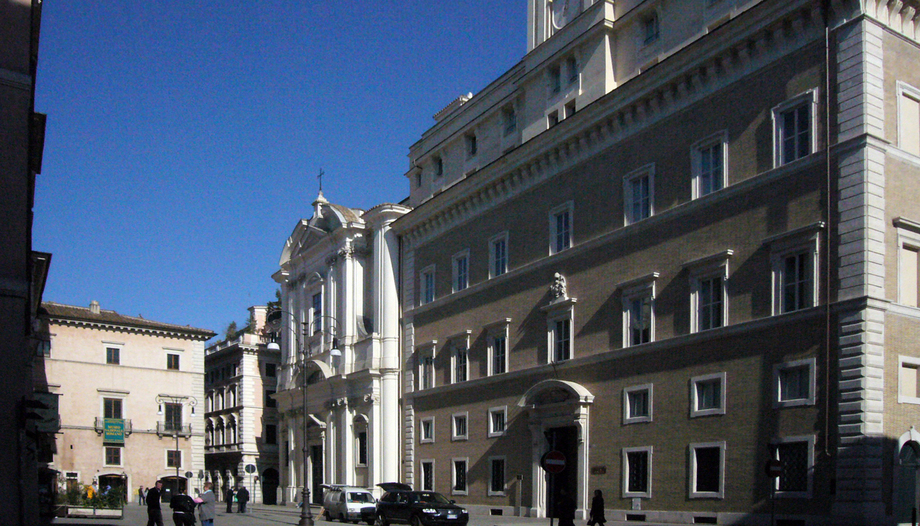– Supernatural University of the Holy Cross wants to create a new research laboratory. The initiative is among the objectives of the five-year Strategic Plan (2024-2029) that the University of Rome approved in recent months and which is articulated along four lines, from research to sustainability.
This year marks the 40th anniversary of the founding of the Pontifical University of the Holy Cross, the Roman university dear to the heart of the world. St. Josemaría EscriváThe inaugural Mass of the first academic year was celebrated by Blessed Alvaro del Portillo, founder of Opus Dei, and carried out by his successor, Blessed Alvaro del Portillo. The inaugural Mass of the first academic year was celebrated by Blessed Alvaro del Portillo himself on October 15, 1984 in the church of St. Jerome of Charity in Rome.
As a happy coincidence of timing, we also worked on a new Strategic Plan, which will accompany the development of the University of the Holy Cross during the next five years.
Among the first fruits of this Plan - defined on four main aspects that will be discussed in more detail below: research, teaching, third mission and sustainability - is the creation of a "Research Laboratory", which will aim to support the various research groups and centers already active at the University.
Issues related to the University's mission
In terms of content, the Holy Cross Research Laboratory will promote those topics that are closely related to the mission of the University, which basically refers to the deepening of the truths related to the universal call to holiness, also proclaimed by the Second Vatican Council.
In this line, Holy Cross promotes themes such as the Christian value of secular realities, the sanctification of work and daily life, the role of the laity in the construction of a more human society in the light of the Gospel. All of this is oriented towards a harmonious conception of the relationship between faith and reason, as the Constitution of Pope Francis on Universities and Ecclesiastical Faculties "Veritatis Gaudium" also states in its Proemium.
Chilean priest Juan Carlos Ossandón, associate professor of Biblical Hermeneutics at the Faculty of Theology, was appointed scientific coordinator of the laboratory.
7 groups connected
There are currently seven research groups linked to the Laboratory, which are already working as a result of two calls for projects launched in the two previous academic years. The topics on which these groups reflect in an interdisciplinary way and in which dozens of universities from different countries are participating refer to the Catholic identity of universities, the expectations and ideals of young people, the theology of evangelization, human creativity, models of governance in the Church, the rediscovery of the person and the culture of care as a response to the anthropological crisis.
Commenting on the activation of the new Research Laboratory, the Vice Rector of the University, Giovanni Zaccaria, to whom it reports organically, clarified how the initiative is the culmination of an internal listening process that has also been highly appreciated in the external evaluation of the University carried out by the AVEPRO Agency - quality evaluation - of the Holy See.
Strategic Plan
We spoke earlier about the Strategic Plan 2024-2029. This too was the result of a process of updating the Quality Policies that the University of the Holy Cross initiated in 2021, actively involving both the governing bodies and the Faculties and the various administrative technical services. In 2024 the University then welcomed the external evaluation commissioners appointed by the Holy See, and following the recommendations received it was decided to integrate all the work done in the new five-year development lines.
"More than a list of objectives, this Plan is the expression of a common project, the fruit of an open confrontation among all the souls that make up Holy Cross," said Rector Fernando Puig on one of the occasions when the Plan was presented. "The underlying aspiration is not only to address the upcoming academic challenges, but to outline a guide for the academic work of the coming years, rooted in Christian values and in dialogue with contemporary culture," he added.
As mentioned above, there are four major areas of intervention around which the Plan is structured. First, research, which represents the living soul of a university. The Plan states: "It is not only a matter of broadening the fields of research, but of strengthening the dialogue between the ecclesiastical sciences and the humanities, creating connections capable of giving new perspectives to theological and philosophical reflection".
A second area is that of teaching, the very essence of any university. In this sense, we insist on the need for continuous renewal of teaching methodologies, in order to respond to the needs of a constantly changing society.
And again, the third mission, the commitment to society. In this case, the Pontifical University of the Holy Cross intends to extend its commitment beyond its academic boundaries, strengthening its presence in Rome and throughout the world, for example through cultural outreach activities that also involve the general public.
Finally, there is the issue of sustainability, which affects virtually all dimensions of the Strategic Plan. This will require a collective effort to improve management processes and foster the professional growth of technical-administrative staff and faculty, as well as a long-term financing plan.
"Working together will be the key to making these projects a reality, to continue making the University of the Holy Cross an active and influential player in the academic world and in society, at the service of the universal Church," concluded Rector Puig.







